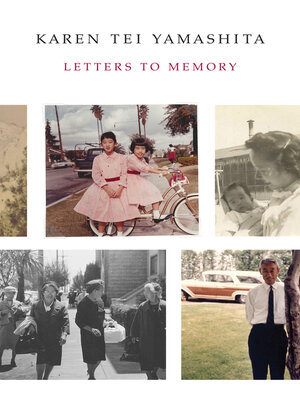
Sign up to save your library
With an OverDrive account, you can save your favorite libraries for at-a-glance information about availability. Find out more about OverDrive accounts.
Find this title in Libby, the library reading app by OverDrive.



Search for a digital library with this title
Title found at these libraries:
| Library Name | Distance |
|---|---|
| Loading... |
An excursion through the Japanese-American internment using archival materials from the author's own family.
In this unique memoir, Karen Tei Yamashita draws on her family's history and creates a series of epistolary conversations with composite characters representing a range of academic specialties. Historians, anthropologists, classicists—their disciplines, and Yamashita's engagement with them, are a way for her explore various aspects of the internment and to expand its meaning beyond her family, and our borders, to ideas of debt, forgiveness, civil rights, and community. From a National Book Award finalist, Letters to Memory is "in moments deeply personal and impressionistic and in moments pulling back into a voice of epic omniscience" (The Boston Globe).
"Interrogates the cruelty of internment and the random nature of immigration, war, birth and death and disease through her own probing, lively correspondence . . . The irony and dark humor of Yamashita's interrogations, of her nimble prose and sentences, illuminate the tragedies." —Los Angeles Times
In this unique memoir, Karen Tei Yamashita draws on her family's history and creates a series of epistolary conversations with composite characters representing a range of academic specialties. Historians, anthropologists, classicists—their disciplines, and Yamashita's engagement with them, are a way for her explore various aspects of the internment and to expand its meaning beyond her family, and our borders, to ideas of debt, forgiveness, civil rights, and community. From a National Book Award finalist, Letters to Memory is "in moments deeply personal and impressionistic and in moments pulling back into a voice of epic omniscience" (The Boston Globe).
"Interrogates the cruelty of internment and the random nature of immigration, war, birth and death and disease through her own probing, lively correspondence . . . The irony and dark humor of Yamashita's interrogations, of her nimble prose and sentences, illuminate the tragedies." —Los Angeles Times







